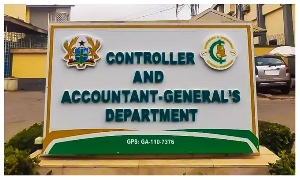Accra, Aug. 6, GNA - The Electoral Commission (EC) on Wednesday warned that any minor who register during the on-going voter registration exercise would be identify and prosecuted in accordance to the electoral laws. Dr. Kwadwo Afari-Gyan, EC Chairman warn parents to advise their wards below the voting age 18 years from registration as the act constitute a criminal offence, "no body should accuse me for causing the arrest and prosecution of such minors."
He also explained that people engaged in double registration would be captured during the electoral computation process and would be prosecuted accordingly.
Speaking at the first in a series of the Peace and Anti-Violence Forums for Election 2008, organised by the Institute for Democratic Governance (IDEG) Dr Afari-Gyan urged all democratic stakeholders to play their respective role for the compilation of credible voters register.
The forum on the theme; "Towards Peaceful and Credible Elections 2008" offers the democratic stakeholders an opportunity to brief, and discuss with, the Ghanaian public issues related to preparations towards the December 2008 elections.
He said current voter registration exercise is bedevilled with deliberate wrong doing. "those who abuse the right deserve to be punished."
Dr. Afari-Gyan said Article 42 of the 1992 Constitution offers citizen of Ghana of 18 years of age or above and of sound mind the right to vote; "if you are not age 18 by August 10th, you cannot register.even if your 18th birthday is August 11th you are not entitled to register.
You commit an electoral offence if your name enters our register." The EC Chairman said after the registration the public would be given an opportunity to scrutinize the register during the exhibition of the Voters Register to challenge any name, "which should not be on the register."
On the call for extension of the registration process, Dr Afari-Gyan explained that the EC projected to capture 1.2 million voters, during the exercise but "if at the end of the exercise and we believe that there are still genuine qualified voters who could not register, we make provision for them."
Dr Afari-Gyan said electoral management for credible results is a shared responsibility among the various stakeholders, including the electoral management body, the Government, political parties, media, judiciary, contesting candidates, and party agents.
"It's incumbent on all to play our respective roles efficiently and effectively. government to provide adequate funds in a timely manner, avoid abuse of incumbency, avoid the temptation to control or interfere with the operations of the electoral management body.
"The Judiciary must settle dispute without delays, media must give equitable access to all political parties and report accurately to ensure that the electorate makes informed decision.
"The political parties must behave in an orderly manner refrain from interfering with activities of opponents; abide by the electoral code of conduct," he said.
Dr Afari-Gyan also tasked the security agencies to be transparent, neutral and fair to all political parties .in fact they must adopt zero tolerance for violence and deal swiftly and firmly with any one who violates the law, irrespective of the party he belongs to.
He said a situation where security personnel administer selective enforcement of the law must not be encouraged, "we must not look elsewhere when operatives of ruling party commits the offence and deal with operatives of opposition drastically; it has the recipe for violence."
Dr Emmanuel Akwetey IDEG Executive Secretary explained that forum offers representatives of political parties, religious bodies, traditional councils, youth groups, as well as persons from professional bodies, the business community, civil society, representatives of development partners, and the media opportunity to interact with heads of key institutions.
It intends to provide key governance institutions such as the Electoral Commission, Police Service, the Judicial Service, and National Peace Council the opportunity to dialogue with Ghanaians on what they are doing to ensure a peaceful, credible and a violence free election in December 2008.
Representatives from democratic institution used the occasion to ask the Electoral Commission questions on the registration process, security, funding, independence of the commission, integrity of the electoral system and mandate of the temporary electoral officials.
General News of Wednesday, 6 August 2008
Source: GNA












